《廣東省高考英語一輪總復(fù)習(xí) Module2 unit 61 Design課件 北師大版 新課標(biāo)》由會員分享��,可在線閱讀���,更多相關(guān)《廣東省高考英語一輪總復(fù)習(xí) Module2 unit 61 Design課件 北師大版 新課標(biāo)(33頁珍藏版)》請在裝配圖網(wǎng)上搜索���。
1��、Part 1 Of 21. imagine vt. 想象,幻想,猜測 imagine (doing) sth. Can you imagine life without hot water? 你能想象沒有熱水的生活嗎��? 同時,imagine后可跟that或how引導(dǎo)的從句。 I imagined that she was quite surprised when she heard the truth. 我想她聽說真相后一定很驚訝�。 1.他以為人們不喜歡他,但他們是喜歡他的。 _ _He imagines that people dont like him, but they do.imagi
2��、nation n. 想象imaginary adj. 假想的��;虛構(gòu)的2. 她想象著自己走進(jìn)辦公室�,遞上辭呈。She imagined _ the office and _ her resignation. 3. 你可以想象我是多么驚訝�。 You can imagine _.【答案】2. walking into; handing in3. how surprised I was2. contrastvt. 把與相比 常用搭配:contrast A with / and B It is interesting to contrast the two lifestyles. 比較這兩種生活方式很有
3、趣���。 n. 常用搭配:in contrast to / with意思是“和 形成對比(相反),比較起來”,介詞短語, 后接名詞�。相比較的兩者,一般都會形成鮮 明的對照��。 The blue curtain provides a beautiful contrast to (with) the white wall. 藍(lán)色的窗簾和白色的墻壁形成美麗的對比���。In contrast to her sister, she was always considerate towards others.與她的姐姐截然相反, 她總是能體諒他人�。in contrast / by contrast 相當(dāng)于副詞,“相
4、比之下”,“與相反”���。但要注意,這個用法通常放在句首,用作狀語����。The old house had been large��;by contrast the new flat seemed small and cramped.老房子很大,相比之下,這套新公寓又小又窄��。1. 對比之下, 這篇文章顯得更突出����。 _ _ _2. 白色的云朵和湛藍(lán)的天空形成了美麗的對比。 _ _By contrast, this article is more outstanding. / Compared with that one, this article is more outstanding.The white
5�、clouds provide a beautiful contrast to (with) the sky.3. promote vt.提拔,常用搭配:promote sb. to sth. The young army officer was promoted to the rank of captain. 這個年輕軍官被提升為上尉。 促進(jìn),增進(jìn),鼓勵,支持 We must promote commerce with neighboring countries. 我們必須促進(jìn)與鄰國的貿(mào)易���。 He likes to read biographies of great men to promot
6����、e himself. 他喜歡讀偉人傳記來提高自己����。 政府決定發(fā)展公共福利�。 _ _The government decided to promote public welfare.promotion n. 促進(jìn),提升,推廣4. fix ones eyes on / upon 注視 如果這個短語的賓語eyes提前作句子的主語, 則這個句子通常用被動語態(tài)�����。 He stood there and his eyes were fixed upon / on delicious food. 他站在那里�����,眼睛盯著美味的食物��。fix a date for 為確定日期fix ones eyes / atten
7����、tion on (upon) 眼睛盯著/注意力集中在fix sb. up for the night=put sb. up for the night 安排某人住宿fix sb. up with sth.=provide sb. with sth. 提供某人某物5. leavevt. 留下某物�、留給、放在�;某物落在、忘在 某地����,一般與表地點(diǎn)的介詞短語連用。 I left my English book at home once again. 我又一次把英語書遺落在家里���。 Youd better leave your e-mail address to us. 你最好給我們留下你的郵箱地址�。 l
8、eave sb. by oneself=leave sb. alone 意為“把某人獨(dú)自留下”��。 It is very dangerous to leave the children home alone / by themselves. 把兒童單獨(dú)留在家中是非常危險的����。 漢語中的“遺落”在英語中可表達(dá)為:leave或forget。不過,leave多與表場所的副詞(句子或介詞短語)連用���;forget通常不與表場所的副詞連用,但外出時把東西忘記在家里的時候通常用forget�����。試比較: Ive left my pen in the classroom. 我把我的筆落在教室了�。 Ive forgot
9���、ten my pen. 我忘了帶筆了���。表示“留給”、“交給”,一般與介詞with或to搭配���。Leave it with / to me if you are too busy.假如你太忙的話把它交給我吧��。His father left a large sum of money to him when he passed away. 他父親去世的時候給他留下了很大一筆錢���。vt. & vi. 離開����、出發(fā),常用于短語leave for someplace,意為“動身��、出發(fā)(去某地)”����。 He left Beijing for Shanghai. 他離開北京前往上海。leave屬非延續(xù)性動詞,它不能和
10�、表示一段時 間的詞連用,如果要表示“離開一段時間”, 要用be away來代替。 I have been away for several months. 我已經(jīng)離開幾個月了���。n. 休假,假期;許可,同意 I have 3 days leave. 我有3天的休假。 He asked his headteacher for sick leave. 他向班主任請病假�。 常用短語take leave of, take ones leave意為“向告別”。Mary took her leave without saying goodbye to us. 瑪麗不辭而別�����。leave作使役動詞, 表示“使/
11�、 讓保持某種 狀態(tài)”,常用搭配leave+賓語+賓語補(bǔ)足語�。 a. 用形容詞作賓語補(bǔ)足語 Leave the door closed when you go out. 出去時記住要關(guān)門���。 b. 用不定式作賓語補(bǔ)足語Leave her to do it herself. 讓她自個兒去做���。c. 用現(xiàn)在分詞作賓語補(bǔ)足語They left me waiting there alone for about one hour. 他們讓我在那獨(dú)自等了一個小時。d. 用過去分詞作賓語補(bǔ)足語 John left the job unfinished when he went out to play. 約翰出去玩
12��、的時候他手頭上的工作還沒完成��。leave的過去分詞left, 常用作后置定語,表示 “剩下的”�。 Ive got two tickets left for tomorrows film. 明天的電影票我有多余的兩張。 1. 他們打算早晨動身去羅馬�����。 _2. 你為什么不能讓她一個人待一會兒��? _They are leaving for Rome in the morning.Why cant you leave her alone?3. 我把鑰匙忘在辦公室了�����。 _4. 到5點(diǎn)的時候�����,辦公室里幾乎沒剩下什么人了。 _ _Ive left my key in the office.By 5 oclo
13���、ck there was hardly anyone left in the office.6. sell vt. 出售 sell sth. at a high price 以高價出售某物 sell sth. at a loss 賠本出售某物 sell sth. at a discount 減價出售某物 be sold out of 賣光 I persuade him to sell his car to my uncle for 100,000 yuan. 我說服他以10萬的價格將車子賣給我叔叔�����。注意其中介詞的使用:“賣給某人”介詞 用to�����;價格用for����。如果表示某物銷售狀況不錯,常常將se
14��、ll與well 搭配,且不用被動語態(tài)��。 This kind of clothes sells well. 這類型的衣服賣得不錯���。 The tickets for the film were completely sold out. 這部電影的票已售完。sale n. 銷售on sale表示減價出售(美)����;出售(英)�;上市�����;廉價的�����,特價的The latest model of this washer is now on salein your shops. 這種最新型號的洗衣機(jī)目前正在你們的商店出售�。Is this toothpaste on sale today?這種牙膏今天打特價嗎?且on sale多指商品性質(zhì)的東西����。This shampoo is on sale.這種洗發(fā)水正在銷售中。for sale 待售We have many types of cosmetics for sale.我們有許多種化妝品待售����。sales tax 銷售稅salesman 推銷員
 廣東省高考英語一輪總復(fù)習(xí) Module2 unit 61 Design課件 北師大版 新課標(biāo)
廣東省高考英語一輪總復(fù)習(xí) Module2 unit 61 Design課件 北師大版 新課標(biāo)

